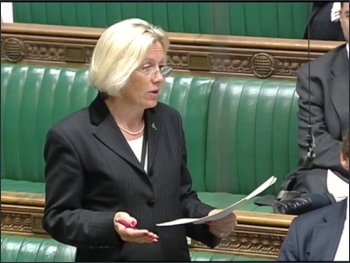Burnham-On-Sea’s MP has explained why she abstained in last week’s controversial parliamentary vote about raising students’ university fees.
Tessa Munt decided not to vote for or against the motion to increase tuition fees in England to up to £9,000 per year.
This week, she’s told Burnham-On-Sea.com why she voted in this way:
“I am not one of life’s natural abstainers. However, last Thursday, I exercised my right under the Coalition Agreement to abstain from voting on the proposals to allow Universities to charge increased fees.
This was a difficult decision. I have always believed that education should be free, and I am fundamentally opposed to government-encouraged and sponsored debt, and to the idea of student loans.
Sadly, my view of education (funded through taxation) isn’t on the agenda. My hopes ended abruptly when Labour introduced tuition fees almost immediately after its election success of 1997 and the principle of free education for all fell. From that point forward, it was inevitable that University Vice Chancellors would seek the chance to charge more.
Had the country voted in a Lib Dem Government, our MPs would have set a different set of priorities and dealt with the deficit with a different set of cuts. I have no doubt we would have met our promise to phase out tuition fees over a short number of years. However, the Lib Dems did not form the Government, and we are where we are – with the ability to try to negotiate a better deal.
A key question for me was whether the level of potential debt would put bright but poorer students off going to University? When Labour introduced student tuition fees, I thought poorer students would be put off, but that didn’t happen. In fact more students went to University – and more of those students came from poorer families. With the new charges, I am concerned again – but have been assured that if there are any signs of a drop in the number of applications from poorer students, action will be taken.
I did not vote against the proposals because they are so much fairer than either the NUS or Labour’s Lord Browne’s proposals. Last week, I had to weigh up whether my objections outlined above were offset sufficiently by a progressive package of measures which will ensure that:
• UK students don’t have to pay any fees in advance, for the first time including more than 200,000 part-time students each year (who are often poorer, have missed their first chance and are often women), removing a real barrier to higher education
• Universities will have a charges cap of £6,000; only those Universities which massively improve access for less well-off but bright students will be able to charge over £6,000 but no more than £9,000
• no one will have to pay anything back until their salary reaches a higher threshold than before (£21,000 in 2016, uprated each year)
• all graduates will repay less each month than they pay currently under the previous Government’s system
• a quarter of the lowest earning graduates will repay less overall than they have to now
• over half a million more students will be eligible for non-repayable grants of over £3,000 for living costs than they could have now
• almost one million students will be eligible for more overall maintenance support than they can get now
• students from poorer backgrounds will have an extra £150m from a bursaries programme
• there will be tough sanctions on Universities who fail to improve their access for students from disadvantaged backgrounds
I am shocked that after so many years of a Labour Government, the gap between rich and poor is wider than ever. What I want is for anyone with the ability to go to University to able to go, regardless of their personal or family financial circumstances. Our Universities are world class and we should be proud that we have something which students across the world want.
I have no doubt that undergraduates will question increasingly the value of what they get for their money at University and expectations will force changes over time. We have to question value – do degrees in ‘Golf Management’ and ‘Surf Science and Technology’ or modules on ‘David Beckham Studies’ really justify the time and costs of attending University? Wouldn’t those students be better served using the further education system or an apprenticeship? Why do some Universities include ‘reading weeks’ within the chargeable term, when undergraduates have significant holiday periods during which they can read?
The biggest barrier to those from poorer backgrounds going to University is that they don’t see themselves as potential graduates and don’t have this aspiration. That is why I think it is so important that money goes into early years via the pupil premium. Closing that gap and increasing social mobility has to be Government’s main priority.”







